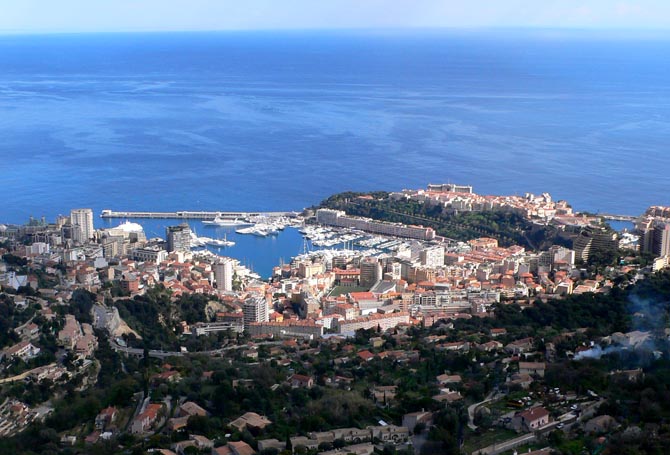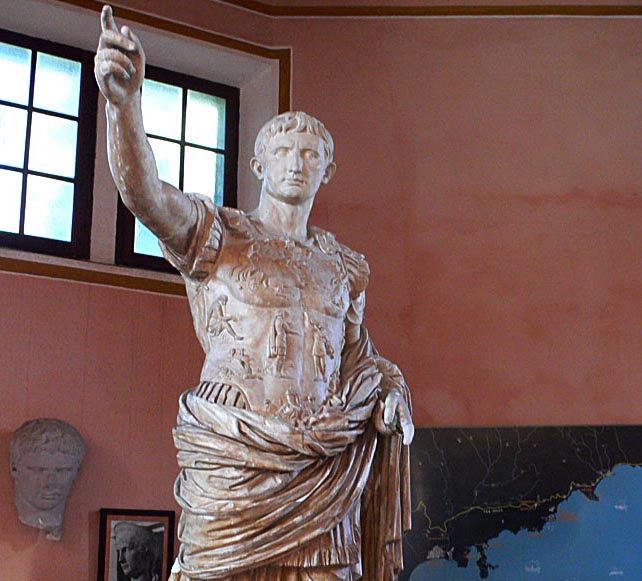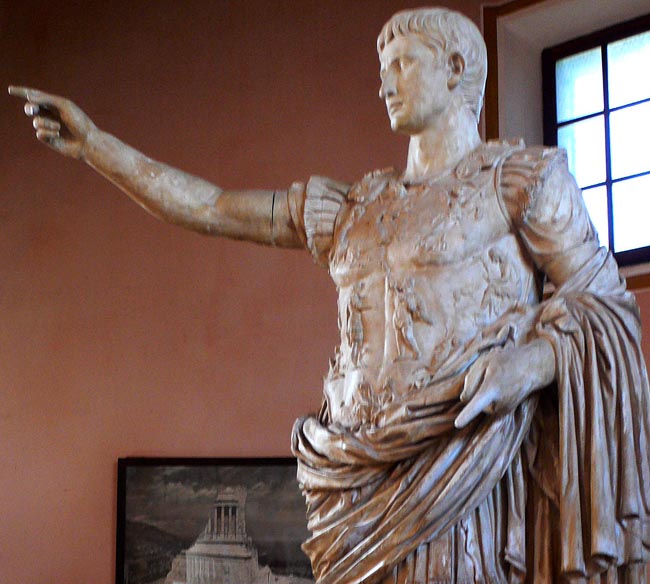Arrogant Power: Rome and the US
Recently, exploring the area NE of Nice, we ended up at La Turbie, high above Monaco. Later exploration of the background to a famous monument there once again led to some surprising links with present-day politics.
As we walked through the village, we had to pass through a group of mourners in a street outside a church - nobody was taking photos and neither did I. It was a lovely day, which somebody couldn’t enjoy any longer. La Turbie’s main claim to fame is a grander reminder of mortality - La Tropheé des Alpes - its ruins dominating the village
http://www.beyond.fr/villphotos2/turbieP01.html
The Trophée des Alpes, or Trophy of Augustus, was a 50 m high monument to the power of Rome and the glory of Augustus. Now only 35 m high and half in ruin, it's still an imposing monument, over 2000 years after it was built.
http://www.beyond.fr/sites/trophee.html
One might have thought we might have learned some lessons in all that time, but exploring the background to this monument reveals remarkable parallels with today, and that some politicians go on making some of the same mistakes, due to similar arrogance and ignorance.
In 13 BC, during the reign of Augustus (who had been Octavian until 31 BC) the Romans planned a new coast road into Gaul (Provence). This road became the Via Julia Augustus (or Via Julia, later to merge into the Aurelian Way that was built 150 years later. Augustus used this route to conquer the Ligurians and bring the Pax Romain to Provence.
http://www.beyond.fr/sites/trophee.html

Statue of Augustus in the Trophée’s museum with map of the Via Julia Augustus
At La Turbie the road passed over the lowest point on a ridge that ran out from Mont Agel. This was not only a strategic site, it was also the highest point on the long Roman road into Gaul and marked the gateway between Italy and the Roman conquests of Gaul.
http://www.beyond.fr/sites/trophee.html

The model in the museum showing how the monument looked when constructed
Memory of vertigo
As we climbed up, partly on the inside, I suddenly knew that we would come out on an open platform with a vertiginous view. I had just remembered that I had been here before, with a girlfriend, decades ago. I remembered clearly that as we emerged from inside onto the platform there was no barrier, and I had almost clung to the wall at the back with a sudden attack of vertigo, while my girlfriend casually peered over the edge!

Now, in a more safety-conscious age, there was a comforting steel barrier. The memory of the sensation was very clear, but I had entirely forgotten the location. Could it really be that long ago that I’d been here before - another intimation of mortality.
Ruins
The ruin of the Trophy began about 15 centuries ago, with the decline of the Roman Empire. In early 400 AD the Wisigoths entered Provence, the Vandals passed through and other "barbarians" added to the general destruction of the area and the Trophy.
The religious powers that increased towards the end of the Merovingian dynasty disliked the Trophy, considering it as dedicated to the pagen Apollo, and around 700 AD, the Monks of Lérins arrived to destroy the statues.
...
Louis IV ordered the Trophy blown up in 1705, but the 17-century-old construction largely withstood his efforts. The durable stone was pillaged to build the Saint-Michel church as well as numerous other constructions ...
http://www.beyond.fr/sites/trophee.html

This huge, ruined monument reminded me of Shelley’s poem, Ozymandias (1818)
I met a traveller from an antique land
Who said: — Two vast and trunkless legs of stone
Stand in the desert. Near them on the sand,
Half sunk, a shatter'd visage lies, whose frown
And wrinkled lip and sneer of cold command
Tell that its sculptor well those passions read
Which yet survive, stamp'd on these lifeless things,
The hand that mock'd them and the heart that fed.
And on the pedestal these words appear:
"My name is Ozymandias, king of kings:
Look on my works, ye mighty, and despair!"
Nothing beside remains: round the decay
Of that colossal wreck, boundless and bare,
The lone and level sands stretch far away.

Imperial propaganda
Augustus had a lot more to say than Ozymandias, and his autobiographical epitaph has been pieced together from various monuments to him scattered around what was the Roman Empire. The title gives the flavour:
The achievements of the deified Augustus by which he placed the whole world under the sovereignty of the Roman people, and of the amounts which he expended upon the state and the Roman people.
E.g. : a section related to La Trophée, which also has echoes of recent US imperialism:
The Alps, from the region which lies nearest to the Adriatic as far as the Tuscan Sea, I brought to a state of peace without waging on any tribe an unjust war ... the Cimbri and Charydes and Semnones and other peoples of the Germans of that same region through their envoys sought my friendship and that of the Roman people. On my order and under my auspices two armies were led, at almost the same time, into Ethiopia and into Arabia which is called the "Happy," and very large forces of the enemy of both races were cut to pieces in battle and many towns were captured.
http://www.livius.org/ra-rn/res_gestae/res_gestae06.html
The price of arrogance
But I noticed that while he’d referred to the friendly Germans, he’d omitted one of the Roman empire’s greatest military disasters, the annihilation of three legions, one tenth of Rome’s military might, by the Germans in the Teutoburg forest!
I remembered reading that when news reached Augustus he was unable to sleep, banged his head against the wall and cried “give me back my legions”. I put this phrase into Google and, in one of those weird coincidences, instead of the expected link to a site about classical history, the first link was to an article in the Boston Globe - supporting my point about the link between Rome and the US today, comparing US policy in Iraq to Roman policy in Germany! It’s a very interesting article, I recommend reading the whole thing:
'Give me back my legions!' Rome's most humiliating defeat -- and a lesson for America
By Cullen Murphy May 20, 2007
... Some Romans blamed sheer incompetence, some the bad weather, some a supernatural judgment. No one at the time hinted at the true explanation, the strategic premise of the disaster, which was simply this: The Roman disinclination either to understand the mind or credit the capabilities of people unlike themselves.
"Underestimation of space was matched by the under-rating of people," one historian concludes. Another writes, "The Romans simply could not believe that their military forces had been outfought by the northern barbarians." Even if evidence had been presented, in advance, of barbarian precocity, he goes on, "Augustus and other Roman officials would not have been receptive."
According to Suetonius, after receiving news of the battle Augustus could be heard hitting his head against a door and lamenting aloud, "Quinctilius Varus, give me back my legions!"
Those words -- "give me back my legions" -- have echoed hauntingly down the centuries. They have particular force today as America breaks its army in Iraq, a predicament brought on in part by habits of mind with long antecedents - an Augustan pedigree.
Boston Globe
Arminius/Hermann/Siegfried - the German hero
In the 19th century a monument was erected to the leader of the triumphant Germans:

In 1875, a huge bronze statue was erected in Germany to commemorate the event on what was believed to be the immediate area of the battle. The "Hermann's Denkmal" (Memoria) is to be found on a high hill near Detmold, facing south towards Rome, with sword held aloft, and foot pinning the Roman eagle to the floor.
http://varusbattle.com/index.html
Of Arminius, the Roman historian Tacitus wrote, "He was undoubtedly the liberator of Germany, a man who did not, as did other kings and generals, challenge Rome in its early stages, but when it stood at the zenith of its power. In battles he fought with varying success, but in the war he remained unconquered. His deeds live on in the songs of his people...." (Tacitus, Annals, 1, 57,58)
These songs were handed down through the generations, and the story of Arminius became transformed into myth in the process.
The Correspondences between Arminius and Siegfried
Famous twentieth-century researchers ... retraced the development of these epic poems and discovered that their hero, Siegfried, is indeed the figure whose Latin name has come down to us as Arminius.
http://www.harbornet.com/folks/theedrich/hive/Medieval/Siegfried.htm
From Germany to the US

http://www.ci.new-ulm.mn.us/index.asp
As a point of interest a similar statue was built in New Ulm, Minnesota, USA, in 1897, by German immigrants and settlers, to commemorate their settlement in America. (Some 35% of the American population is of German descent).
ibid
Despite this reminder, actually on US soil, of a famous Roman imperial disaster, Rumsfeld (German origin ?), and co. went on to repeat the Romans' arrogant ignorance of other peoples - and ordinary Americans, like the Romans, are paying a heavy price - in this case those they attacked are paying a far greater price.
The Romans learned from the disaster and never again tried to conquer the Germans beyond the Rhine and the Roman empire lasted another four hundred years. But the kind of people who got the Americans into the Iraq disaster talk about attacking Iran:
In a veritable blitz of editorials and opinion pieces published Wednesday and Thursday, the Wall Street Journal, the Weekly Standard, and National Review warned that Tehran had passed a significant benchmark in what they declared was its quest for nuclear weapons and that the administration must now plan in earnest to destroy Iran's known nuclear facilities, as well as possible military targets, to prevent it from retaliating.
Comparing Iran's alleged push to gain a nuclear weapon to Adolf Hitler's 1936 march on the Rhineland, Weekly Standard editor William Kristol called for undertaking "serious preparation for possible military action – including real and urgent operational planning for bombing strikes and for the consequences of such strikes."
[Explaining, in a style which might have been borrowed from Augustus]
"[A] great nation has to be serious about its responsibilities," according to Kristol, a leading neoconservative champion of the Iraq war and co-founder of the Project for the New American Century, "even if executing other responsibilities has been more difficult than one would have hoped." [to put it mildly]
http://www.antiwar.com/lobe/?articleid=8852
Kristol should go back a lot further in German history for a more apt and sobering lesson about "great nations" and the "difficulties" they can experience.
